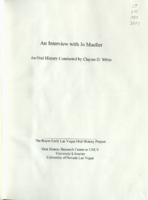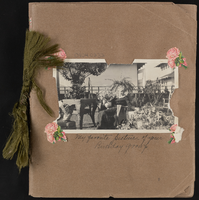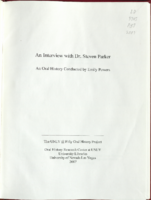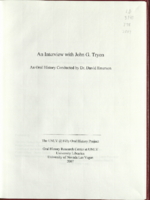Search the Special Collections and Archives Portal
Search Results

Transcript of interview with Jo Mueller by Claytee White, August 26, 2011
Date
Archival Collection
Description
Jo Ann and Hal Mueller arrived in Las Vegas in 1956 when he accepted a meteorologist position. In addition to raising their two children, Jo was active in PTA, worked for Weight Watchers, and was a volunteer with League of Women voters. She tells the story of meeting Hal and their whirlwind romance to the altar, moving to the Caroline Islands and eventually choosing Las Vegas over Seattle as their next career assignment. Las Vegas became their permanent home and Jo reflects on life and experiences here.
Text

Diane Orgill oral history interview: transcript
Date
Archival Collection
Description
Oral history interview with Diane Orgill conducted by Claytee D. White on March 30, 2018 for the Remembering 1 October Oral History Project. In this interview, Diane Orgill, a volunteer with Red Cross, discusses her experience on the night of the October 1, 2017 mass shooting in Las Vegas, Nevada. She speaks of her role as a Red Cross representative at the Emergency Operations Center and the efforts of the Red Cross command center to provide a sense of order in the chaos. She describes some of the support provided to the survivors through the Family Assistance Center and the Disaster Action Team, giving an in-depth explanation of how these sections of the Red Cross function.
Text

Helen J. Stewart birthday scrapbook
Date
Archival Collection
Description
Helen J. Stewart birthday scrapbook
Mixed Content

Transcript of interview with Dr. Steven Parker by Emily Powers, December 19, 2006
Date
Archival Collection
Description
Text

Transcript of interview with John G. Tryon by Dr. David Emerson, February 21, 2006
Date
Archival Collection
Description
Text

Transcript of interview with Will Provance by David G. Schwartz, July 14, 2016
Date
Archival Collection
Description
Text

Della Coates interview, March 18, 1978: transcript
Date
Archival Collection
Description
On March 18, 1978, collector Bill Hitchcock interviewed Della Coates (b. June 17th, 1919 in Birmingham, Alabama) at her home in Las Vegas, Nevada. In the interview, Della Coates discusses her time working for the telephone company. She also speaks about the changes in education and about changes throughout Las Vegas.
Text
Bob Stupak Professional Papers
Identifier
Abstract
The Bob Stupak Professional Papers (approximately 1900 to 2007) primarily documents the career of Las Vegas, Nevada casino owner, Bob Stupak. The materials in the collection include the planning of two resorts in Las Vegas, Nevada created by Bob Stupak: Vegas World and the Stratosphere. The collection also includes planning materials for the Titanic Las Vegas, an unbuilt resort envisioned by Stupak. Planning and promotional materials for Stupak's resorts including photographs, memorabilia, audiovisual materials, advertising mockups, and architectural drawings. The collection includes several scrapbooks and photographs of Stupak and his wife Sandy at events around Las Vegas. The materials also document Stupak's political campaigns running for mayor of Las Vegas in 1983 and 1987 and lieutenant governor of Nevada in 2006.
Archival Collection
Henry and Anita Schuster Papers
Identifier
Abstract
Collection is comprised of correspondence, speeches, essays, meeting minutes, photographs, research materials, publications, press clippings, awards, and event programs (1941-2011) that document the life of Henry Schuster, and his work with his wife Anita. Materials are mainly related to the Holocaust and to Holocaust memory and survivor organizations (especially the Holocaust Survivor's Group of Southern Nevada, which the couple founded, and L’Œuvre de Secours aux Enfants). Genealogical information is also included, as well as records of Henry Schuster’s time in the U.S. Army and his studies at the Manhattan Technical Institute.
Archival Collection

County agent project progress report, Domestic water supply for Bunkerville and Mesquite, November 1, 1939
Date
Archival Collection
Description
Wells drilled previously were not sufficient to solve area water problems. Wittwer recommended consulting with the United States Geological Survey and State Engineer before any more wells were drilled. Report signed by John H. Wittwer as County Extension Agent. Project Number: State Office No. 282, Clark Co. No. 22. Name of Project: Domestic water supply for Bunkerville & Mesquite.
Text
